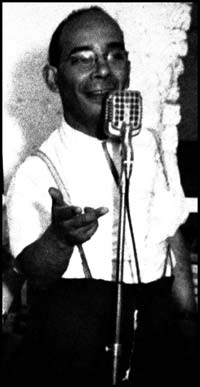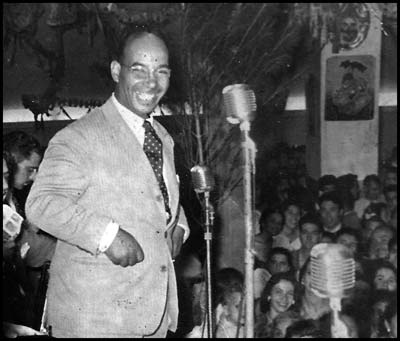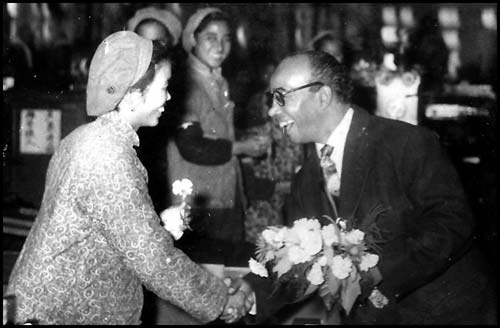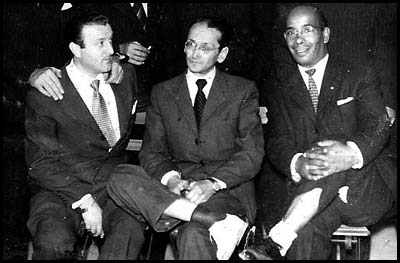By
El Negro Mela, a personality of Buenos Aires

y father was son of an African immigrant who arrived in Argentina as stowaway on a cargo ship, he had run away from the island of Barbados where he lived in slavery.
 His original surname was Miller, but when he arrived in Buenos Aires he pronounced it badly or was not well understood, so they wrote down Mela. His mom (my grandma) was Uruguayan.
His original surname was Miller, but when he arrived in Buenos Aires he pronounced it badly or was not well understood, so they wrote down Mela. His mom (my grandma) was Uruguayan.
Dad was born in Dock Sud, district of Avellaneda in the province of Buenos Aires. When he was a child he settled with his mother in Montevideo, because my grandfather had died very young when Dad was only five years old.
He was a boarding school pupil in the Colegio Don Orione and he only returned to Buenos Aires for his military service.
He devoted himself to boxing to support my grandma. Later he worked in the Buenos Aires City Hall and was awarded by the Mayor because he had given back a box containing jewels, and for that reason he was promoted to foreman.
By that time, he liked to recite country material very much. He appeared successfully at a contest held on La Voz del Aire, a radio station which was across Radio El Mundo on Maipú in the 500 block and was hired as reciter for the first group led by the dancer and choreographer, Santiago Ayala, aka El Chúcaro.
Therebefore he quit the dancing milieu and began to work as announcer and tango glosador of the Alberto Coral orchestra, substituting for a time the one in charge at the Centro Asturiano Campo Covadonga. He was very successful, but when the official presenter came back, he had to leave.
 Then he was hired by the famous Tango Bar on Corrientes Street, to be the presenter of the orchestras and artists of the house. So he presented: Julio Sosa, Enzo Valentino and had a boom with the Orquesta Muzzi (or Mussi, we do not know who he was), with a comment which was known as “La cacerola”, which was no other thing but a parody, a joke, to the Italian singer Nicola Paone, who at that time was in Argentina appearing to great acclaim and had in his repertoire a song which was in vogue: “La cafetera”, and he closed by mentioning the tango “Rodríguez Peña” which was the signature tune of the Orquesta Muzzi.
Then he was hired by the famous Tango Bar on Corrientes Street, to be the presenter of the orchestras and artists of the house. So he presented: Julio Sosa, Enzo Valentino and had a boom with the Orquesta Muzzi (or Mussi, we do not know who he was), with a comment which was known as “La cacerola”, which was no other thing but a parody, a joke, to the Italian singer Nicola Paone, who at that time was in Argentina appearing to great acclaim and had in his repertoire a song which was in vogue: “La cafetera”, and he closed by mentioning the tango “Rodríguez Peña” which was the signature tune of the Orquesta Muzzi.
When Mario Soto, the author of “Pasional”, quit the Osvaldo Pugliese orchestra, the leader started the search for a presenter but to no avail. Then, Osvaldo Ruggiero told don Osvaldo that the presenter of the orchestra was in the Tango Bar, and the latter exclaimed «¡El Negro Mela! Go get him!». The owner of the Tango Bar told my father the news and added: «If something goes wrong, you’ll still have a job in my house».
His first presentation was in June 1953, at the Club Defensores de Santos Lugares. There they told him that for a month he was subject to approval. Dad, luckily passed the test and stayed with Pugliese for twenty years, until 1973.

In 1959 he traveled on a tour, of nearly five months, of Russia, China, Pakistan, Afghanistan, Mongolia, Paris, Lisbon. They had left from Buenos Aires in August and came back on December 30.
Later he was presenter at the Boliche de Rotundo, owned by Francisco Rotundo, in the neighborhood of Villa Luro, he also presented Donato Racciatti and worked at other tango venues. Finally, he retired and was agent for paperwork concerning car sales.
An important piece of information: Dad, besides being the Pugliese orchestra presenter, was also its agent.

Director’s Note: Luis Mela was, also, a good tango dancer –he used to say he was a disciple of the mythological Negro Pavura-, and as such, he was awarded at the contests of the Teatro Verdi in La Boca (1937) and of the Orfeón Español, on Piedras Street (1938). He was, undoubtedly, a very much loved person in the milieu and one of the icons of a tango period in Buenos Aires. We want to thank Carlos Di Iorio, friend and loyal visitor to Todo Tango, for having made us contact his son.